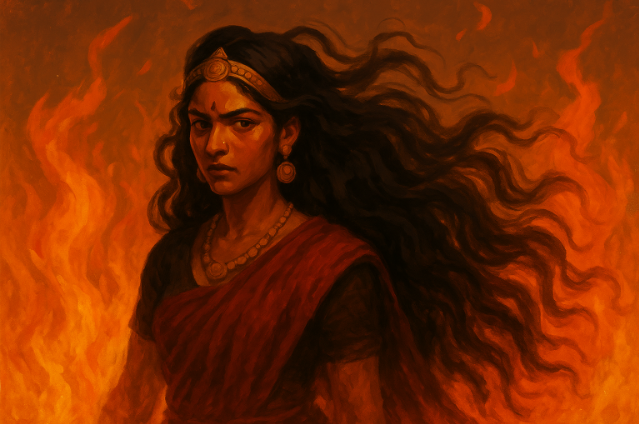
Draupadi is among the most revered women in Indian mythology. Her character in the Mahabharata is not the main focus, but she becomes the main force behind the battle of Kurukshetra. Her humiliation at the hands of Duryodhana in the court of Hastinapur, and her disrobing by Dushasana, leave her scarred. However, she turns her pain into rage and speaks up for her rights when no one else does. When the entire hall is filled with people who could have protested against the injustice but didn’t, her voice becomes a symbol of resistance against patriarchy. Yudhisthir gambled away his younger brothers and his wife in the game of dice, and the question that arises with her voice is – Who gave him the right to gamble her away?
Feminism is often linked with Draupadi, just as it is with Sita nowadays. The term feminism refers to a movement that began for the equal representation of women's rights. The Suffragette Movement was for securing voting rights for women, but recently the perspective has changed significantly. Draupadi’s strength as she spoke up against the injustice meted out to her shows how strong she truly is. In an age when women were not expected to speak out of turn, Draupadi turned the tables by doing something Sita couldn’t do. In Valmiki’s Ramayana, Sita does eventually call out Rama for doubting her character, despite her purity. But the public perception of her character transformed her into the ideal wife and mother. Her example is often used to define the ideal woman. The socialisation of gender norms is quite visibly apparent. Draupadi’s voice of resistance becomes a form of feminism.
During her swayamvar, too, her choice to select her husband becomes crystal clear when she rejects Karna because of his caste. Although the source is not clearly defined, Draupadi’s agency in making her life’s decisions is portrayed here, though there might have been some influence from Lord Krishna as well. Her agency comes to an end when she is compelled to accept the five brothers as her husbands. Be it a boon from a previous birth or her husband’s loyalty to their mother, her fate is sealed. She faces mudslinging because of her marital status. Her friendship with Lord Krishna is one of the best examples of male–female friendship. The dynamic of this relationship has seen many interpretations, however.
Rage becomes a central factor in her story. After all, she was born out of fire. Her rage in the face of injustice, and her revenge—bathing her hair with the enemy’s blood—gives rage a whole new definition. Female rage has only recently become a widely discussed topic. With Paris Paloma’s song Labour coupled with the phrase “run like a woman,” the rage resonates even more. Her down-to-earth nature becomes evident when she takes up the job of a cook during their exile in King Virat’s kingdom. The king’s brother-in-law, Kichaka, looked at Draupadi with lustful eyes and met a fateful death at Bhim’s hands.
Justice is a very big thing. Although the term has been reduced to a mere joke due to the dire state of the Indian judiciary, justice does get delivered in the epic. Draupadi’s friendship with Lord Krishna remains one of the best elements throughout the Mahabharata. During her hour of need, the only one who responded to her call for help while she was being disrobed was the Lord himself. Draupadi’s story is an example that the Almighty truly helps when the call comes from the depths of the heart.
Draupadi’s vengeance was evident in her blood-red eyes and the vows she took to avenge herself. The exact moment when she questioned the entire assembly—filled with people who ignored the suffering pleas of a woman, and not just any woman, but the Queen of Indraprastha—was a question she asked on behalf of women around the world. Even Sita’s suffering is brought into question. Draupadi breaks the “damsel in distress” trope, often prevalent in both Western and Indian epics. A damsel in distress is typically a heroine who falls into trouble and needs the hero’s help. Even though Draupadi did receive help from the Lord himself and one of her husbands, her iron resolve never faltered for even a single instant.
Linking Draupadi with feminism, rage, and strength makes perfect sense. Feminism is just an ideology, a movement that is often misunderstood in the modern context. What began as a fight for justice has unfortunately become confused with misandry. Misandry refers to the hatred of men, which can stem from certain causes. Female rage reaches its peak in Draupadi’s final moments of revenge and vengeance. Rage is universal. However, there is a stark difference between male rage and female rage. Draupadi’s female rage feels divine—pure and fierce from the depths of her heart.
The notion that a woman is her husband’s property is depicted through the gambling episode in Duryodhana’s palace. Yudhisthir, the most pious and wise among the five brothers, ironically turns out to be the most foolish. His decision might have also been mixed with a sense of defeat.
